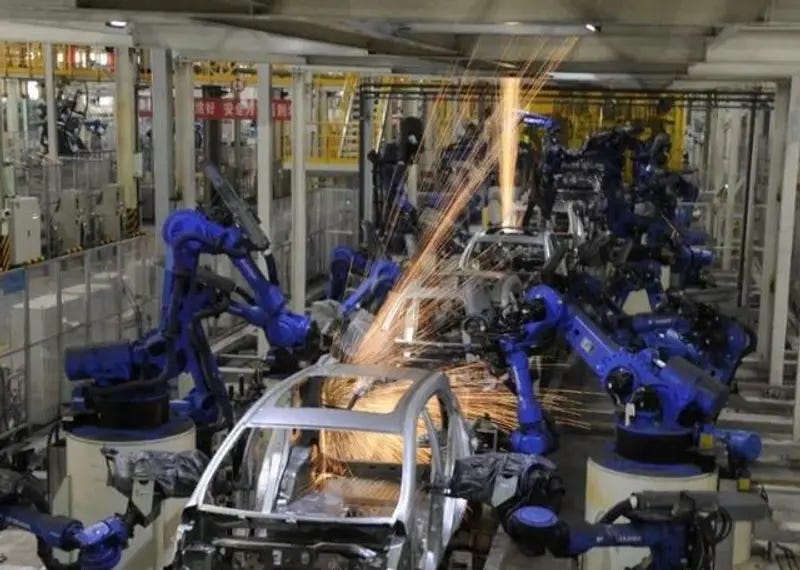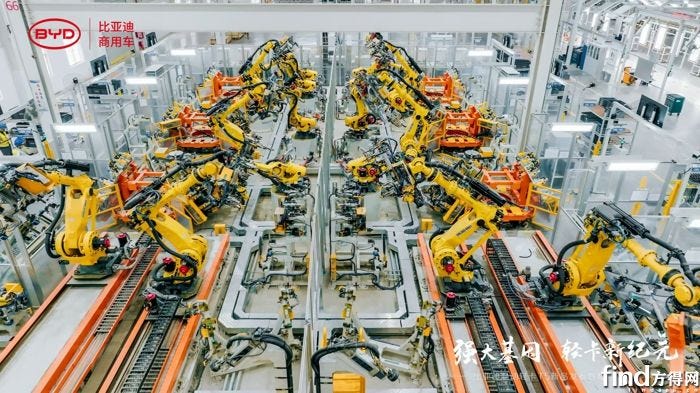Automation at BYD Factory
In the past few years, the rise of industrial robot usage in China has been very impressive. 2022 saw China having more than half of robot installations in the world:
As you can see, China had more than 7x the installation that US had. This rapid increase in robot has allowed China to reach probably top 3 in robot installation per 10000 workers. Since the installations have come recently, many new factories in China are some of the most automated factories out there.
A particular striking example is BYD. It has built many new factories in the past 3 years and they are all very automated. Most recently, BYD invited people to come with its Hefei plant. This plant has 1200 welding robots and is 97% automated!
BYD’s self developed tire grabbing machine can automatically feed in screws, grab the tires, laser align to the body & drive in the screws. It installs all 4 tires in just 48s.
But when I followed the airline industry, I was struck by the amount of engineer resources that Airbus devoted to the production line to increase throughput. That level of automation & efficiency has allowed Airbus to dream 75 A320s per month. BYD factories are just as impressive. BYD itself not longer buys advanced robotics tools, but also develops its own and design incredibly efficient & automated assembly lines. Vertical integration, supply management & highly efficient production lines are all major competitive advantages for BYD.
Aside from new plants, BYD is also extremely good at converting older plants to have higher automation. Even back in 2020, BYD’s Xian plant was extremely automated. It had 300 welding robots and was 97% automated. BYD uses AGVs, robots and intelligent warehousing to achieve maximal efficiency. That is a common theme among all the articles of BYD plants. AGVs to move things around, robots to do all the assembly, welding, screwing and painting and intelligent warehousing to provide all the needed parts.
BYD built its highly automated lines with help from Guangzhou Risong, JEE Tech and Dalian Haosen. All of them have their own automation experience that BYD drew from. It’s this incredible culture of cooperation that has allowed BYD and other Chinese companies to become more and more competitive.
Back in 2022, BYD signed cooperation with Dobot to work together in improving intelligent manufacturing. That resulted in putting Dobot’s advanced intelligent SCARA robot products to be placed in BYD production line. Soon after, BYD signed contracts for more than 10000 robots to raise automation at its auto and battery factories.
And this is going beyond just its own factories. Recent unveiling of BYD’s battery JV with XCMG showcased a super automated production line.
Its new commercial vehicles plant in HuaiAn is also really automated.
BYD uses the most advanced painting robots here and has achieved 100% automated painting process. It uses 131 welding robot in its welding line and has achieved over 90% automation there.
And of course, it is also planning to bring in humanoid robots this year for the role of final inspection in its production lines. Right now, this is still mostly a manual process, but automation is also creeping in here.
The key to efficient and modern production line is embracing Industry 4.0 and automation. You also need highly connected world powered by industrial 5G so that AGVs and everything else can move precisely in the factory floor. With this type of setup, plants can run completely dark without any humans around. This type of round the clock production allows the highest level of productivity.
Building these type of factories are extremely capital intensive and requires willingness to try new things out to further improve automation and throughput. BYD has never been afraid of pushing forward efficiency and learning new things. All of that shows up in its ability to ramp up sals from around 400k in 2020 to 3 million last year.





Thanks for the share ! As a matter of comparison: how automated are competition's factory in China and in Europe for example?